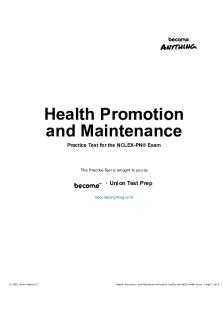Health Promotion and Maintenance- Toddler and Preschooler PDF

| Title | Health Promotion and Maintenance- Toddler and Preschooler |
|---|---|
| Course | Generalist Nursing Practice II: Primary & Secondary Care of the Family |
| Institution | Temple University |
| Pages | 3 |
| File Size | 61 KB |
| File Type | |
| Total Downloads | 39 |
| Total Views | 138 |
Summary
Outline...
Description
Health Promotion and Maintenance: The Toddler and The Preschooler: Growth and Development: Toddlers: - Measure and plot length, weight, and fronto-occipital circumference (FOC) o Watch for changes in percentile - Physical assessment - Development o Screening tool o General observations and questions o Referral if not meeting milestones Nutrition: - Transition from bottle or breast to solid foods - Eating patterns o Toddlers often eat small meals - Guidance about food choices - Eating habits now lay foundation for healthy eating in the future Physical Activity: - Needed to develop fine and gross motor skills - Appropriate activities for young children - Develop habits of physical activity to prevent sedentary lifestyle Oral Health: - Child should begin seeing dentist at 1 year of age - Develop brushing, flossing skills, and habits - By 2 years of age, child has full set of 20 primary teeth Mental and Spiritual Health: - Observe interactions between parent and child - New accomplishments help foster positive self-image and mental health Relationships: - Family is primary relationship - Assess family strengths Disease Prevention Strategies: - Immune system is maturing - Immunizations - Screening for vision, hearing problems - Importance of not being exposed to cigarette smoke Injury Prevention Strategies: - Car seats and booster seats - Gun safety - Choking hazards - Other homes children visit - Home environment o Friends - Falls o Relatives - Drownings Self-Concept: Toddlers and Preschoolers: - Healthy self-concept is fostered by parents o Setting up successful play experiences o Praising the child for successes o Using effective limit-setting techniques o Realizing and appreciating the child’s unique characteristics General Strategies to Promote Health During Health Supervision Visits: - Explain procedures and purpose of procedures to parents - Allow parents to help during exam - Encourage parents to ask questions
- Encourage parents to share general perceptions of the child - What to expect at the next visit Strategies for Toddlers and Preschoolers: - Teach them about their body - Understanding limited to things they can see/feel/hear o ie: stomach vs liver - Explain growth and developmental tasks that are expected in the coming months - Provide toys that encourage development o Ie: Safe climbing toys - Review developmental screening tool with parents Involving the Family: - Family is the constant in the child's life - Family is the expert about the family - Must be involved in health supervision visits - Family influences the child in both risk and protective factors - Families who handle stress well and have healthy lifestyle patterns offer security for the young child At Each Visit: Family Assessment: - Interview family about developmental status of child - Observe family interaction and discipline style - Discuss parental concerns Mental Health Issues and Concerns: Toddlers and Precschoolers: - Self-regulation to soothe and comfort self - Assessment of child and family - Child should develop sense of right and - What is a typical day like? wrong - Observe communication patterns - Adequate sleep and rest are needed - Self-esteem - Family spiritual orientation - Related to tasks child can do (Example: brush teeth independently, toilet training) Self-Regulation: - Controls o Anger o Excessive desires for objects or food o Other nonsocial behaviors - Child must learn to control and regulate self o Positive discipline Sleep Issues: - Nightmares - Pattern of sleep - Night terrors - Where child sleeps Benefits of Positive Self-Esteem: - Decreased rates of depression - Decreased rates of anxiety - Decreased rates of eating disorders Toddlers and Relationships: - Enjoy playing with other children - Play "side by side," not cooperatively - Will play with adults Preschoolers and Relationships: - Play cooperatively with other children - Like to help with tasks ("house") - Setting table - Picking up toys - Improving language skills Separation: - Toddlers and preschoolers must learn to be away from parents - Must learn that parent ill return - Parents may feel guilty for leaving
-
Strategy: Allow child to keep a familiar object with them...
Similar Free PDFs

Health Promotion and Maintenance
- 115 Pages

Essay Health And Health Promotion
- 12 Pages

Health promotion
- 2 Pages

Health promotion
- 12 Pages

Health promotion
- 3 Pages

Handout for G&D and Health Promotion
- 10 Pages

Health promotion model
- 1 Pages

Health Promotion of Toddlers
- 4 Pages
Popular Institutions
- Tinajero National High School - Annex
- Politeknik Caltex Riau
- Yokohama City University
- SGT University
- University of Al-Qadisiyah
- Divine Word College of Vigan
- Techniek College Rotterdam
- Universidade de Santiago
- Universiti Teknologi MARA Cawangan Johor Kampus Pasir Gudang
- Poltekkes Kemenkes Yogyakarta
- Baguio City National High School
- Colegio san marcos
- preparatoria uno
- Centro de Bachillerato Tecnológico Industrial y de Servicios No. 107
- Dalian Maritime University
- Quang Trung Secondary School
- Colegio Tecnológico en Informática
- Corporación Regional de Educación Superior
- Grupo CEDVA
- Dar Al Uloom University
- Centro de Estudios Preuniversitarios de la Universidad Nacional de Ingeniería
- 上智大学
- Aakash International School, Nuna Majara
- San Felipe Neri Catholic School
- Kang Chiao International School - New Taipei City
- Misamis Occidental National High School
- Institución Educativa Escuela Normal Juan Ladrilleros
- Kolehiyo ng Pantukan
- Batanes State College
- Instituto Continental
- Sekolah Menengah Kejuruan Kesehatan Kaltara (Tarakan)
- Colegio de La Inmaculada Concepcion - Cebu







